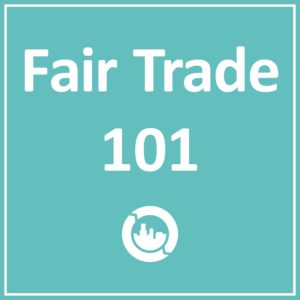Food Trends & Fair Trade
As you walk down your local grocery store aisles, read the latest health magazines, or flip through the channels on your TV, “super foods” have continued to be a constant craze for the last decade. Touted as having particularly beneficial health impacts ranging from higher nutrient values to preventing cancer and diabetes, these products tend to also come from areas outside of the global North. Food trends aside, the growing consumption of these products is having a major impact on the places they are being produced.
Take coconuts for example, from the flesh to the water inside, coconuts have become a hot ingredient in products across the US from milk and yogurt to body scrubs and lotions. Earlier this year, the Food and Agriculture Organization of the United Nations reported that the global demand for coconut is growing at a rate of more than 10% each year. The majority of the coconuts imported to the US come from three countries; Indonesia, the Phillipines, and India. The Philippines, the smallest of the three countries, is the largest exporter of coconuts in the world (accounting for 59% of the market). Another thing to take note of is most of the coconuts that are in our stores come from small shareholder farmers. In the Philippines alone, there are 3.5 million coconut farmers, which means 1 out of every 5 Filipinos is dependent on the coconut industry. However even as demands rise, coconut farmers aren’t benefiting much.
Around 60% of coconut farmers continue to live below the poverty line. Few have enough money remaining after expenses to put into their farms, which leads to lower yields and even lower incomes. The average annual income for a coconut-farming household is around $355 a year, which averages out to less  than one dollar a day. In addition, coconut farmers have very few options as to whom they can sell to. Usually there is only one processor, which means they have to depend on unstable market prices when selling their goods. With the labor being so difficult and with so little to gain monetarily, young people are abandoning family farms in search of better work.
than one dollar a day. In addition, coconut farmers have very few options as to whom they can sell to. Usually there is only one processor, which means they have to depend on unstable market prices when selling their goods. With the labor being so difficult and with so little to gain monetarily, young people are abandoning family farms in search of better work.
Similarly, one South American grain’s rise in global popularity is having a considerable impact on local food supplies. Quinoa’s exponentially growing popularity has created a booming industry in Peru and Bolivia. So much so that it now costs more than chicken, leading many impoverished people who once lived off of the grain to have even less options for nourishment. The need to maintain supply as demand has risen has made many farmers turn to monocropping which has resulted in soil erosion in parts of the countries in which it is grown. Rising profits on the conventional market mean more companies are coming in to reap the capital gains which is leading to worsening working conditions for farmers. However, the heightened price of the grain will not last forever and is already starting to drop. The cost of quinoa began falling three years ago and continued to do so through 2015, dropping down to its 2012 price. The decline in price can lead to an eventual collapse in the industry, which could lead to thousands of Bolivian and Peruvian farmers without work or a way to sustain their families.
Coconut and Quinoa cultivation ar e major industries across the global South and as market demands fluctuate so do the earnings of small scale farmers. The shortcuts being made to meet consumer needs, such as mono cropping, are having detrimental impacts on both the environment and farming communities.
e major industries across the global South and as market demands fluctuate so do the earnings of small scale farmers. The shortcuts being made to meet consumer needs, such as mono cropping, are having detrimental impacts on both the environment and farming communities.
Yet these problems are finally beginning to gain attention. Fair Trade certification guarantees that small scale farmers are getting the wages they deserve, the tools and techniques they need to grow their crops sustainably as well as the support they need to build democratic and equitable farming communities. With Fair Trade Standards being implemented, the Community Development Fund provides an additional amount of money farmers earn when you purchase a product with the Fair Trade Certified seal. Fair Trade standards require 1/3 of the Fair Trade premium to be invested in prevention of soil erosion through environmental projects and agricultural education, and 2/3 towards community development projects.
Companies like Alter Eco have been working to change the lives of quinoa farmers since 2002. With larger premiums and more direct availability of resources, house hold income and diversification of revenue sources have significantly increased. Better economic resources have allowed families to settle seasonally in more populated areas, improving their housing and living conditions and placing the farmers and their families in proximity of better school systems and higher education which have allowed for education levels to increase. With price stabilization, farmers can keep up to 10% of their annual production as well as have more earnings available to spend on fruits and vegetables to diversify their household’s diet.
hold income and diversification of revenue sources have significantly increased. Better economic resources have allowed families to settle seasonally in more populated areas, improving their housing and living conditions and placing the farmers and their families in proximity of better school systems and higher education which have allowed for education levels to increase. With price stabilization, farmers can keep up to 10% of their annual production as well as have more earnings available to spend on fruits and vegetables to diversify their household’s diet.
In addition, businesses like Harmless Harvest, who in 2014 began carrying the first Fair For Life certified coconut water, have been benefiting local communities in Thailand through their premiums by providing hundreds of children with uniforms so that they can have access to education as well as thousands of families with health care through their mobile healthcare units.
Food trends come and go but as consumers we have to keep in mind the producers that have to keep up with them. We have the power to play an active role in creating a more sustainable system for farming communities by supporting the Fair Trade Certified option of products like quinoa and coconut so that people and the planet can benefit equitably.





You must log in to join the discussion. If you are not already a member registering is easy.